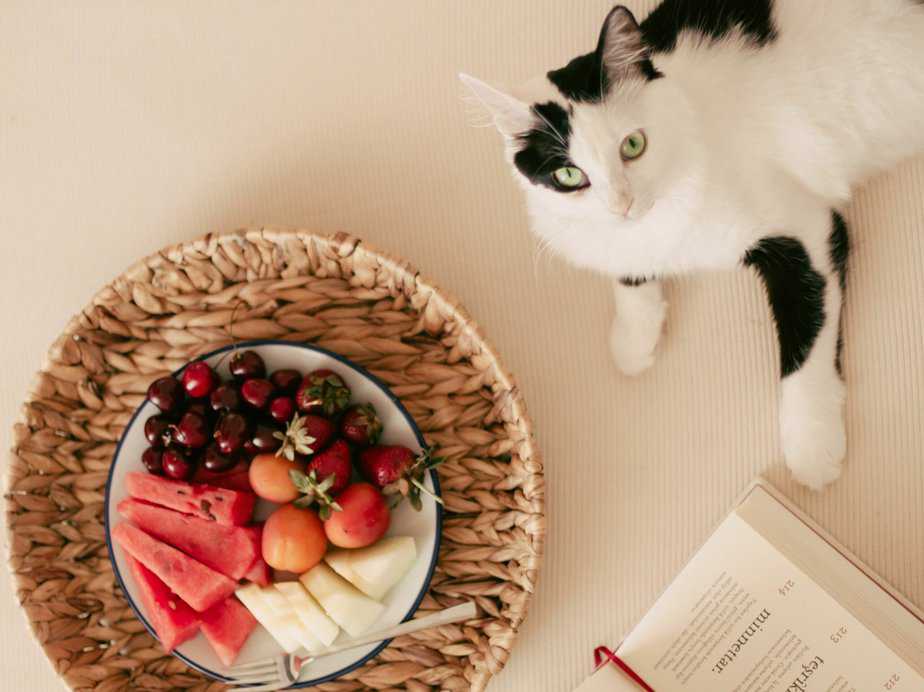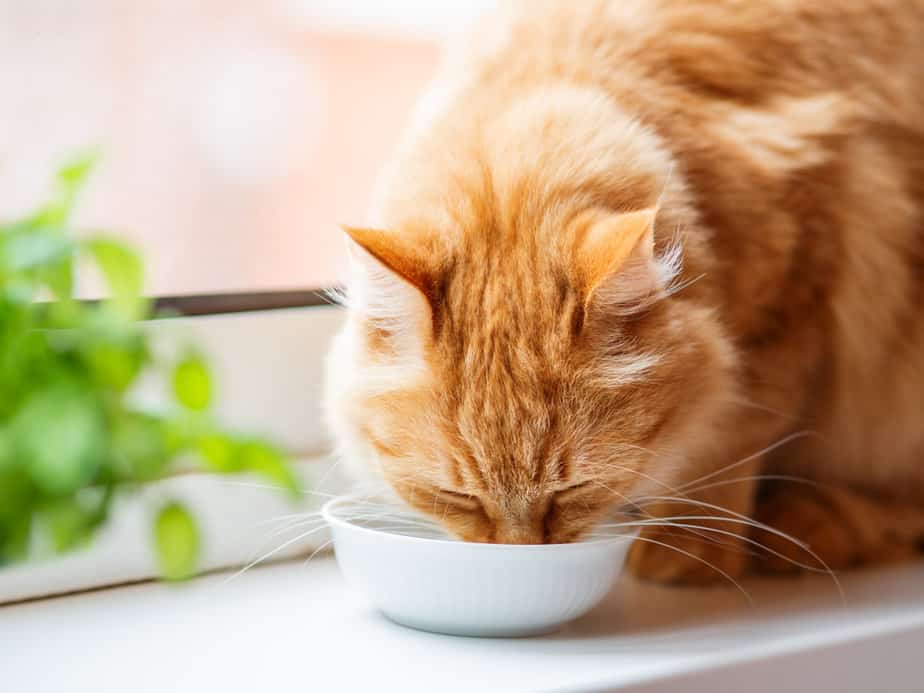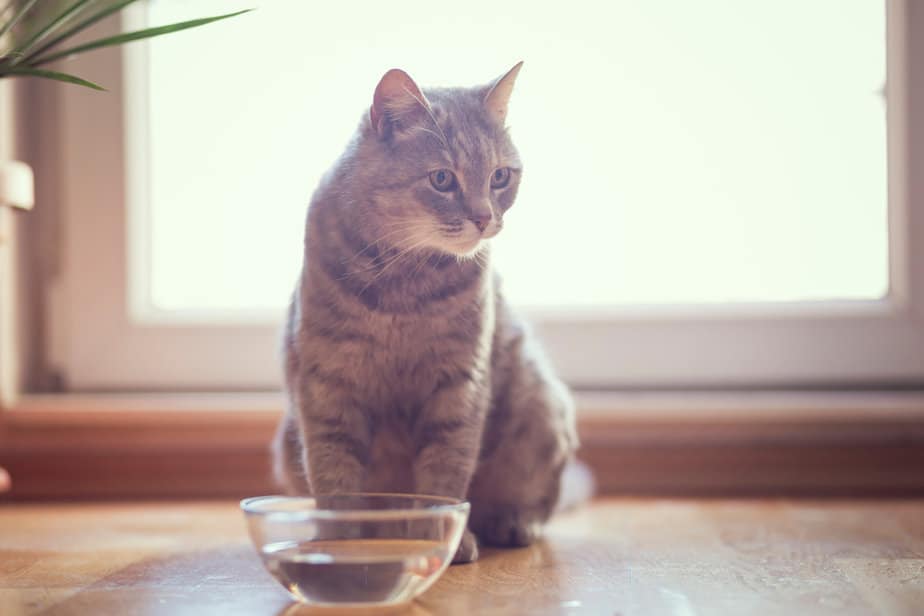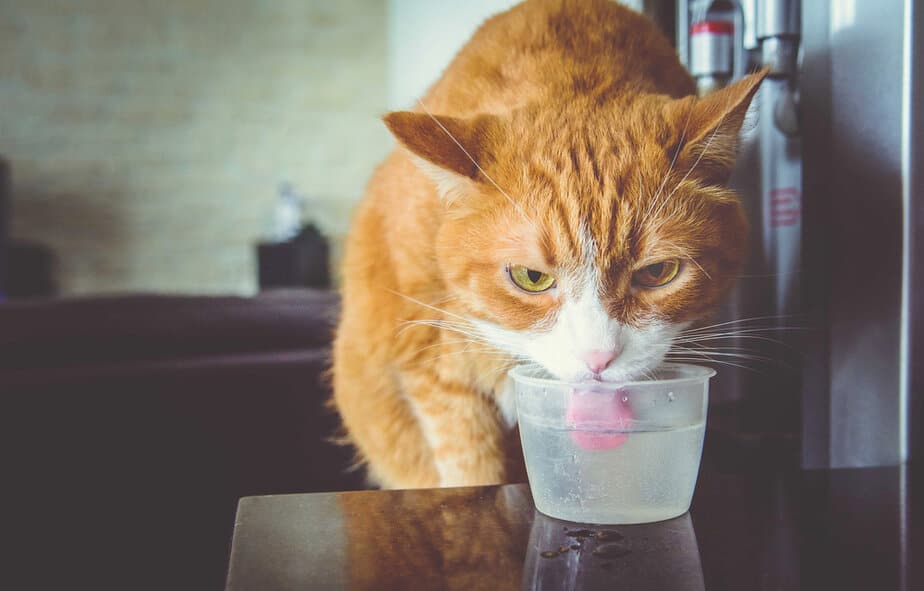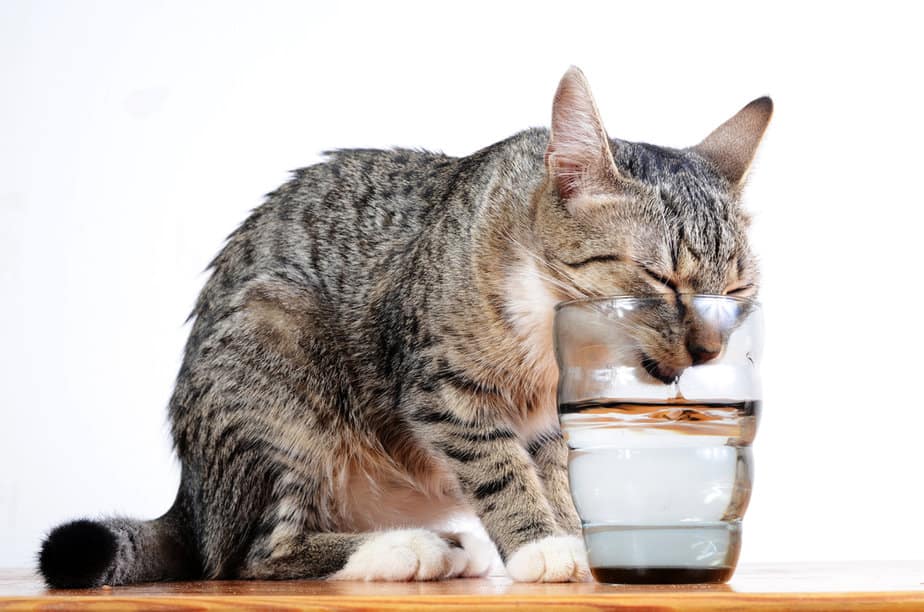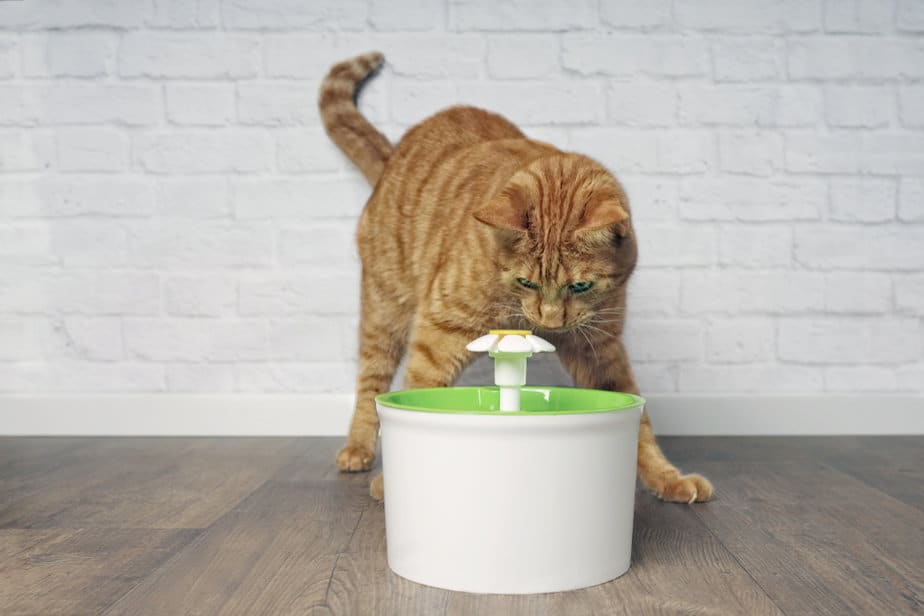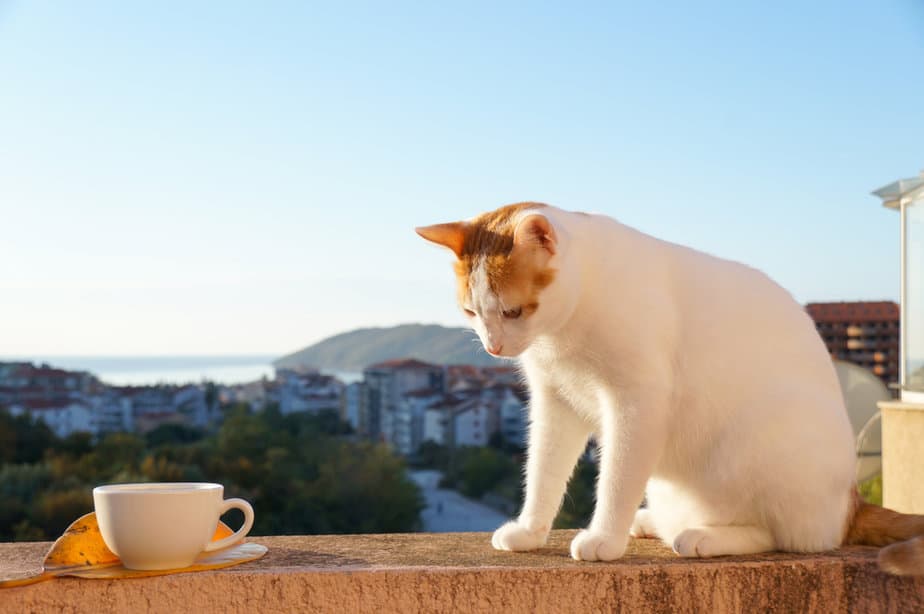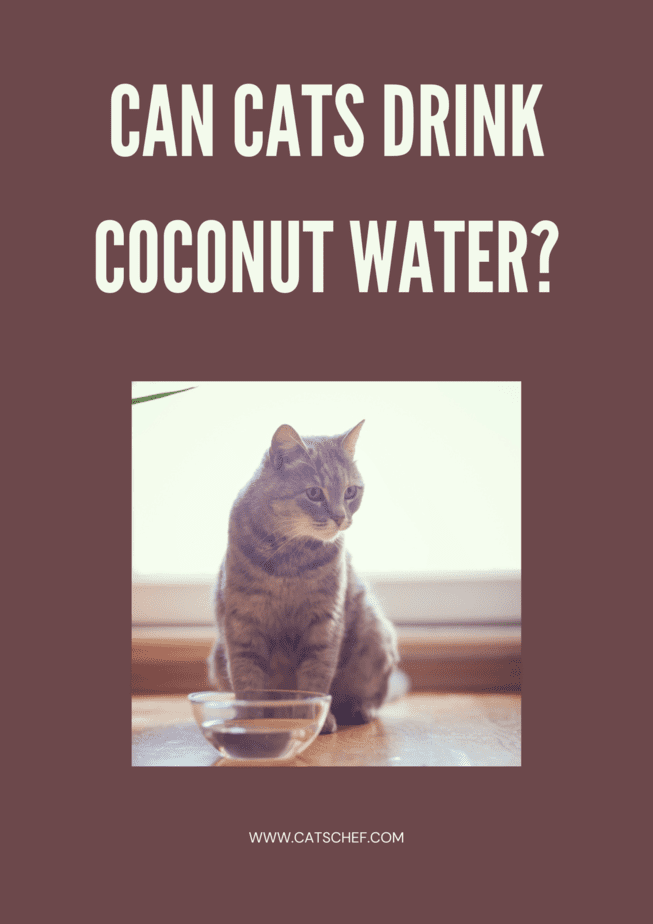📖 Table of Content:
Everyone and their mother seems to be drooling over coconut water! You can’t even take a scroll down Instagram or TikTok without seeing beautifully arranged coconut water mocktails held by freshly manicured nails. “Argh, there’s even a cat holding one! So, can cats drink coconut water?!”
Here’s the thing. You have nothing against quenching your thirst with something other than the regular bottled water you get at Walmart. You’re aware that humans like to spice things up and make their otherwise boring lives a little more exciting.
But, what about cats? Your curious creature can’t seem to stop scrunching up her nose and perking up her ears whenever she catches a glimpse of coconut water. You’re pretty sure she knows this tasty treat’s been hyped up by every celebrity, model, and influencer out there.
“Coconut water this, coconut water that…” She starts losing her mind at the very mention of the word coconut! And, you have no clue whether you’re supposed to feed her a little coconut nibble or a lick of coconut water. You have no clue whether you’re supposed to give her the benefit of the doubt.
But, that’s why we’re here. Our friends over at the ASPCA (American Society for the Prevention of Cruelty to Animals) have put coconut or coconut water on their naughty list. According to them, cats can’t drink coconut water because they can experience digestive problems.
Coconuts and coconut water are driving you nuts (pun absolutely intended), and you’re looking for some answers? Look no more; here’s everything you need to know about cats, coconuts, and what the heck’s inside coconut water.
What’s the deal with cats and coconut water?
“Oh, coconuts and their water! Who wouldn’t want to live their life lounging on the beach, sipping on coconut water? It’s delicious, nutritious, and packed with health benefits!” That’s true, and your furry friend couldn’t be more excited to share that experience with you. Oh, she’s not going?
We can agree on one thing – coconuts are pretty great for humans. Coconuts are fruits that come from a tropical tree, Cocos Nucifera, which sounds like a fancy French dessert. When you open them, you’re greeted with coconut flesh and coconut water (which’s what we came here for, right?).
Coconuts are loved around the world because of everything they bring to the table – flesh, oil, water, milk, AND a bunch of nutritional and health benefits. They’re packed with healthy fats, vitamins, minerals, and antioxidants. And they can boost your immune system and maintain the health of your digestive system.
And, your feline friend might not be able to eat off of that table. You see, cats and coconuts don’t go together. Coconuts aren’t poisonous to cats and they can TECHNICALLY have a nibble without ending up at the emergency animal center. Coconut water isn’t poisonous to cats, either.
But, there’s always a but when talking about your curious creature’s eating habits. Cats are carnivores which basically means they need a VERY specific, thoroughly thought-out diet. They need meat, animal protein, and animal nutrients in their diets to survive and thrive.
They don’t need fruits, veggies, juice cleanses, and detox diets the same way humans do. And, they don’t even possess the digestive enzymes necessary to break down and process most foods humans eat every day. The point being – cats don’t really need coconuts and coconut water.
Can cats drink coconut water?
But, she might be waiting, locked, loaded. Ready to snatch that coconut water right out of your hands the moment that you bring her home from your local Trader Joe’s. “Remember the last time you drank something you shouldn’t have? You can never do that again!”
So, can cats drink coconut water? There are no short answers to that question. But, we can start with a simple “No, cats can’t drink coconut water for a couple of reasons.”
Coconut water that comes straight from the coconut contains a bunch of carbohydrates, electrolytes, sodium, potassium, and magnesium. “There’s nothing wrong with that, cats need nutrients in their diets anyway.” They do, but they don’t need to get them from coconut water.
Coconut water can actually cause digestive problems such as diarrhea, vomiting, and nausea. And, to top that off, the commercially available type of coconut water can contain sugars, sweeteners, and additives. These can cause harm to your cat’s health when consumed over a longer period of time.
And don’t even get me started on those potassium levels that can actually send your furry friend to the emergency animal center before you can even utter “Leave my coconuts ALONE!”
But, does that mean that coconut water’s the worst thing your cat can consume? Of course not – coconut water contains a bunch of nutritional and health benefits you shouldn’t overlook. Your furry baby’s better off sipping on freshwater or bottled water (Fiji, of course!). But, a lick of coconut water shouldn’t be a problem.
What are the benefits of coconut water for cats?
“Wait, what? You’re telling me cats can benefit from coconut water? Didn’t you tell me cats can’t drink coconut water!?” Pet parents around the world know that there’s no such thing as black and white when you’re talking about your precious pets.
Cats are curious creatures. They’re picky eaters but they also want to eat everything they can get their paws on. They’re supposed to eat meat and animal protein but they’re also supposed to get their daily vitamins and antioxidants. They can’t eat certain foods, but they can have a bite or two without getting sick.
Do you see where we’re going with this? Cats can’t drink coconut water because they can get sick from drinking TOO MUCH. But, a sip of coconut water (that’s been approved by your vet) here and there can bring them health, happiness, and a bunch of benefits.
1. Coconut water contains vitamins, minerals, and antioxidants
Coconut water doesn’t come without a bunch of nutrients that can boost your cat’s immune system, maintain the health of her digestive system, and ensure the proper function of her nervous system. With her systems covered, your cat might be interested in giving coconut water a tiny taste test.
But, what exactly get your precious purrincess get from having an occasional lick of coconut water? How about riboflavin, niacin, pantothenic acid, folic acid, biotin, thiamin, vitamin C, potassium, magnesium, and sodium? And trust me, she can use a little bit of each of these to be happy and healthy.
Don’t get me wrong, she should get most of her nutrients from carefully crafted cat food and cat treats. She shouldn’t even consider drinking coconut water to replenish her daily dose of vitamins, minerals, and antioxidants. Consult with your vet and check why.
But, on the off chance that she’s somehow gotten into your coconut water carton and taken a couple of licks, you have very little to worry about. You can even give her a couple of drops yourself whenever she’s giving you her “mommy, you promised you’d give me a treat” look.
And yes, you can sleep sound knowing that coconut water contains a bunch of good nutrients. It’s hardly the worst thing your cat has munched on while you weren’t looking (we know about the parmesan cheese escapades).
2. Coconut water can boost kittens’ immune systems
You don’t want your kitten to get the sniffles, but you weren’t sure how to boost her immune system, right? You’re pretty sure that’s where nutrients come to play. And, kittens should get most of their nutrients from their mother’s milk, kitten milk formula, or carefully crafted cat foods and cat treats.
They should be able to get everything they need from whatever they’re munching on while they’re growing up. But, that’s not to say that they don’t need a helping hand or a pick-me-up that doesn’t contain meat every now and then. And, that’s where coconut water comes to play.
Coconut water contains a bunch of electrolytes and seems pretty similar to the type of water most athletes drink after a workout. Of course, your little munchkin doesn’t have to spend the day running around and causing trouble to deserve a little coconut water lick.
Coconut water can boost your kitten’s immune system and help her battle against different diseases. And, coconut water contains antibacterial and anti-inflammatory properties. That means there’s pretty much nothing you can say against this treat when your kitten gives you the look.
3. Coconut water tastes better
Cats are notorious for not drinking water AT ALL for the most part of the day. Most cats need a little nudge, or some creative 5-minute hack to get them to drink water. And that’s bad because most cats spend their entire lives dancing around dehydration.
Knowing that, you would think that cats can’t taste the water; and that’s why they don’t like wasting their time trying to hydrate themselves. Humans spend most of their lives hearing “Water doesn’t taste like anything!”, and overlooking the fact that they’re the ones that don’t have the necessary taste receptors.
But, cats do. And, they don’t like drinking water anyway. They prefer drinking something with more flavor such as milk or bone broth. They would rather drink something savory than sweet because they don’t possess the sweetness taste receptors.
But, they really enjoy the taste of coconut water. Coconut water isn’t necessarily sweet (and yes, we understand that coconut water comes from coconuts – fruits). But, coconut water tastes nutty and salty with a SLIGHT hint of sweetness (we’re talking about the water, of course, not the Cabernet Sauvignon).
So, on the off chance that your kitten isn’t really interested in drinking water, you might want to offer her a little bit of coconut water every now and then. Remember – always consult with your vet beforehand.
What are the risks of coconut water for cats?
Oh, boy! Coconut water might be giving you “the best summer of my life” vibes. But, letting your feline friend drink a bunch of it might provide you with the worst one. While coconut water isn’t necessarily poisonous to cats, there are NUMEROUS risks to keep an eye out for.
Cats can’t drink coconut water without any repercussions, regardless of how strong and healthy their digestive system could be. Coconut water doesn’t fall under the category of foods and drinks that are a natural part of a cat’s diet. So, they don’t get to be introduced in one without leaving quite a mark.
So, go forth with your wishes to switch things up a bit with something that’s got your furry friend obsessed; as long as you take a peek at some of the risks you might have to face afterward.
1. Digestive problems
“Digestive problems? For my cat that NEVER experiences raging diarrhea after eating something unsuspecting and ruins my carpets!? No, that can’t be!” As a pet parent, you’re familiar with your cat’s sensitive stomach and frequent stomachaches after munching on anything out of the ordinary.
Unfortunately, cats are pretty susceptible to digestive problems. Their digestive systems aren’t equipped with the enzymes necessary to process some foods humans eat regularly. What does that mean for you in terms of making her diet a little bit more interesting?
That means that you have to keep a close eye on her whenever you’re feeding her anything new. But, not before you consult with your vet. Conduct extensive research on whether that something can send your cat to the emergency animal center. Heads up – a lot of the somethings can.
Coconut water and other coconut goods aren’t that high in carbohydrates (which are your cat’s sworn enemies), but they are quite high in fats. Munching on high-fat foods can cause digestive problems because fats can be tough on your four-legged friend’s tummy.
Keep an eye out for anything ranging from nausea, weakness, and loss of appetite to vomiting, and diarrhea. Contact your vet the moment that you notice these symptoms and make sure you keep him up-to-date on whether or not your cat’s been drinking coconut water.
2. Allergic reactions
Cats can’t drink coconut water because they can experience an allergic reaction! When she’s meowing whenever she sees you sipping on a coconut drink or petting your with her paw whenever you’re looking at coconut TikToks – she might be barking up the wrong tree.
While uncommon, coconut water CAN potentially trigger an allergic reaction. She might start showing symptoms such as weakness, watery eyes, runny nose, skin irritations, rashes, hives; even vomiting and diarrhea.
Contact your vet and make sure you give him the scoop on what your cat’s been munching on. Depending on her symptoms, she might have to get a nasal spray, antihistamines, or other oral medications. Vomiting and diarrhea might require IV fluids and supportive care at the animal center.
But, cats are more likely to experience sensitivity when licking coconut water or nibbling on coconut goods. Cats with sensitive stomachs or pancreatic inflammation (or even kidney disease) can be particularly affected by the carbohydrates, electrolytes, and fats found within coconut water.
3. Potassium poisoning
Last, but certainly not least, we can’t forget about potassium poisoning. Potassium poisoning’s the most likely of the risks we’ve mentioned beforehand because coconut water’s BEAMING with potassium.
“Wait, didn’t we say potassium was a good thing? Wasn’t potassium the thing that helped my cat’s systems – immune, digestive, and nervous?” You’re not wrong, potassium’s an electrolyte that’s responsible for several of your cat’s functions – muscle contractions, nerve impulses, and heart function.
Nibbling on foods that are high in potassium can do wonders for your cat’s health. But, that’s not to say that your curious creature should scoff down the entire coconut (water, flesh, and everything). Trust me, eating excessive amounts of pretty much anything can be dangerous for your cat’s health.
For example, have you ever heard of vitamin A toxicity? Vitamin A’s an essential vitamin in your cat’s body. However, consuming excessive amounts of vitamin A can damage her liver and cause extensive bone growth and development.
And, the same thing happens when she’s stuffing her mouth with foods and drinks that have high potassium levels. Her body becomes overwhelmed and starts showing symptoms of hyperkalemia (potassium poisoning).
Some of the most common symptoms are muscle weakness, lethargy and depression, and severe arrhythmias. Some cases show that cats with hyperkalemia experience difficulty urinating. That’s VERY alarming because then they can’t get rid of the excess potassium.
Contact your vet as soon as you notice these symptoms. He should be able to provide your cat with supportive care, manage other underlying conditions, and provide her with fluids to make sure she’s able to get rid of that potassium on her own.
So, can cats drink coconut water?
No, cats can’t drink coconut water! While this tropical treat isn’t poisonous to cats, it doesn’t come without a plethora of risks that can make your cat’s life miserable. What starts as a great bonding moment over your love of all things tropical might easily turn into a disaster.
Yes, keep her paws away from coconuts!
Read more: Can Cats Drink Soda? “Soda-Licious” Or So Done With This Drink?
